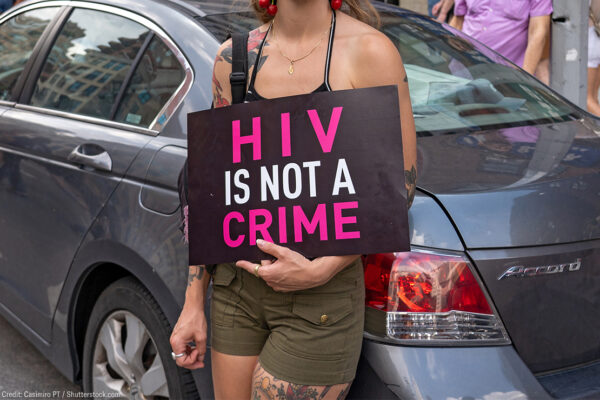Report: California Schools Make Uneven Progress on Improving Sex Ed
Report Shows that Despite Good State Law, Many Schools Don’t Provide Complete Information
FOR IMMEDIATE RELEASE
CONTACT: (212) 549-2666; media@aclu.org
A report released today indicates that although California’s public schools have made great strides in the quality of sexuality education and HIV/AIDS prevention, many districts still teach inaccurate information that fails to provide young people with crucial health information and violates state law. The report reviews sex education in California public schools since the 2003 passage of a groundbreaking state law, requiring that this instruction be comprehensive, medically accurate and free of bias.
The report, “Uneven Progress: Sex Education in California Schools,” provides a snapshot of the state of sexuality education in California public schools based on a survey of school districts around the state. The report was co-authored by Claire Brindis, DrPH, MPH, and Sarah Combellick, MPH, of the University of California, San Francisco’s Bixby Center for Global Reproductive Health, and was commissioned by the ACLU of Northern California.
“Next to family, schools are the front line in the prevention of sexually transmitted infections and unintended pregnancy among teens,” said Brindis, a professor in the UCSF Departments of Pediatrics, and Obstetrics, Gynecology & Reproductive Sciences, and a director of the UCSF Bixby Center for Global Reproductive Health. “Comprehensive sexuality education has been shown to delay sexual activity and to improve contraceptive use among teens who are sexually active. This leads to healthier outcomes for youth, a major win for all of society.”
Brindis notes that the state financial crisis has eroded many health programs and resources for young people, underscoring the importance of schools as the last stronghold in providing comprehensive sex education. Teen pregnancies in California have declined significantly over the past two decades, but the teen birth rate remains higher than in many developed nations. Additionally, rates of some sexually transmitted diseases, such as Chlamydia, remain high among California teens, particularly young people of color.
Among the key findings of the report:
• Sex education in California schools is nearly universal: All but one of the school districts surveyed reported providing sex education, and all reported providing HIV/AIDS prevention education.
• Sex education has improved since the passage of California’s 2003 comprehensive sex education law, with a 15 percentage point increase in the number of schools providing required information about condoms and contraception.
• Despite progress, sex education in many schools is out of compliance with the California Education Code.
• Some school districts omit required information about HIV/AIDS prevention. For example, over a quarter of districts do not teach about the transmission and prevention of HIV. Schools were more likely to teach about abstinence than other required HIV/AIDS topics.
• Sixteen percent of schools teach the medically inaccurate statement that condoms are not an effective way to prevent pregnancy and sexually transmitted infections. One of out five districts reported that although birth control methods are mentioned, most of the time was spent on the benefits of abstinence.
• Some school districts continue to provide abstinence-only instruction that tells young people sex is only healthy and acceptable in the context of marriage, a concept that is not supported by public health science.
• Less than one-third of school districts cover sexual orientation as part of sex education. California law, however, requires that school-based sex education be appropriate for students of all sexual orientations.
• Only 25% of districts discuss the required topic of emergency contraception in both middle and high schools.
“State law recognizes that teenagers need complete, accurate information to help them make decisions about their health and relationships,” said Phyllida Burlingame, Reproductive Justice Policy Director at the ACLU of Northern California. “Comprehensive sex education provides important information that students will need at whatever point in their lives they become sexually active.”
California’s 2003 law, the California Comprehensive Sexual Health and HIV/AIDS Prevention Act (SB 71), helped make the state a nationwide leader in promoting the sexual and reproductive health of its adolescent population. The law requires that sex education in public schools be based in public health science and teach teens about building healthy relationships, the benefits of delaying sexual activity, and accurate information about condoms and contraception. It must include age-appropriate information about abstinence, condoms, sexually transmitted infections and contraception in grades 7-12. Public schools in California are prohibited from using curricula that talk exclusively about abstinence. Instruction that emphasizes the benefits of abstinence while focusing on the failure rates of condoms and other contraceptives is also prohibited by law.
Recommendations from the report include:
• The Legislature should require combined sex education and HIV/AIDS prevention education so that that every student has the opportunity to receive important information about sexual health.
• The Department of Education should enhance its monitoring of school-based sex education and HIV/AIDS programs to ensure compliance with state law.
• Every school district should adopt evidence-based sex education curricula.
The data in the report are based on a survey distributed to a representative sample of 100 school districts in California, of which 33 surveys were completed by district officials most knowledgeable of the district’s policies and practices around sex education.
A policy brief summarizing the findings of the report and presenting recommendations can be found online: http://www.aclunc.org/docs/reproductive_rights/uneven_progress_policy_br...
A copy of the full report can be found online: http://www.aclunc.org/docs/reproductive_rights/uneven_progress_full_repo...
Stay informed
Sign up to be the first to hear about how to take action.
By completing this form, I agree to receive occasional emails per the terms of the ACLU's privacy statement.
By completing this form, I agree to receive occasional emails per the terms of the ACLU's privacy statement.



